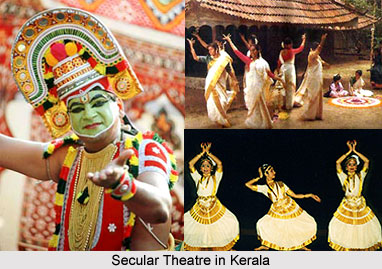 Secular Theatre in Kerala is an essential part of Kerala and it cannot be over-estimated for its contributive value to the enrichment of Malayalam and Sanskrit Literatures. The development and popularization of the varied types of secular entertainment have definitely contributed to the growth of Malayalam Literature and to its elevation to the status of a literary language. The more important of the types under this head are (i) Elamutti-purappatu (ii) Thullal (iii) Rorattiyattam (iv) Mohiniyattam, (v) Kayyukottikkali (vi) Pathakam and (vii) Kathakali which represent between them all varieties of singing, dancing, and acting with the appearance in public of characters in costume.
Secular Theatre in Kerala is an essential part of Kerala and it cannot be over-estimated for its contributive value to the enrichment of Malayalam and Sanskrit Literatures. The development and popularization of the varied types of secular entertainment have definitely contributed to the growth of Malayalam Literature and to its elevation to the status of a literary language. The more important of the types under this head are (i) Elamutti-purappatu (ii) Thullal (iii) Rorattiyattam (iv) Mohiniyattam, (v) Kayyukottikkali (vi) Pathakam and (vii) Kathakali which represent between them all varieties of singing, dancing, and acting with the appearance in public of characters in costume.
As in the case of the purely religious type there is no fixed stage, but unlike it there is always a curtain used; again unlike it, the centre of interest is the actual representation in front and not the temple or the figure of a Goddess. In the case of one at least of these varieties, the method of announcing the performance is singularly effective. The instrumental musician, the Gendakkaran sounds in the evening his instrument in a peculiar manner called Kelikottu, This sound is generally heard within a radius of not less than two miles. Equally effective from the practical point of view is the method of advertisement. When troupes of players come to a village they hold a free performance, called Sevakali, in the village temple. This serves the double function of paying homage to the village deity and acting as a sort of advertisement, it being a common measure of encouragement given by the authorities of the temple to supply free light for the performance.
A more effective way of announcing a troupe of players cannot be conceived, it deserves to be pointed out even at the very outset that all these performances, including those already mentioned i.e., there is no ticket system, and this is something in which our stage stands entirely apart from all other modern stages as far as we know. For the benefit of the village the richer people of the gramam one after another invite the troupe to play in their houses, the expenses being paid by the inviter. A voluntary subscription is sometimes sought from landlords and other big men of the village at the spot in the course of the performance, and this is known as Poli, i.e., voluntary gift. Here, in this act, the rich villager discharges his part of the noblesse-oblige in the matter of intellectual recreation, as much as he does in the matter of supplying free education to the more unfortunate children of the village.




